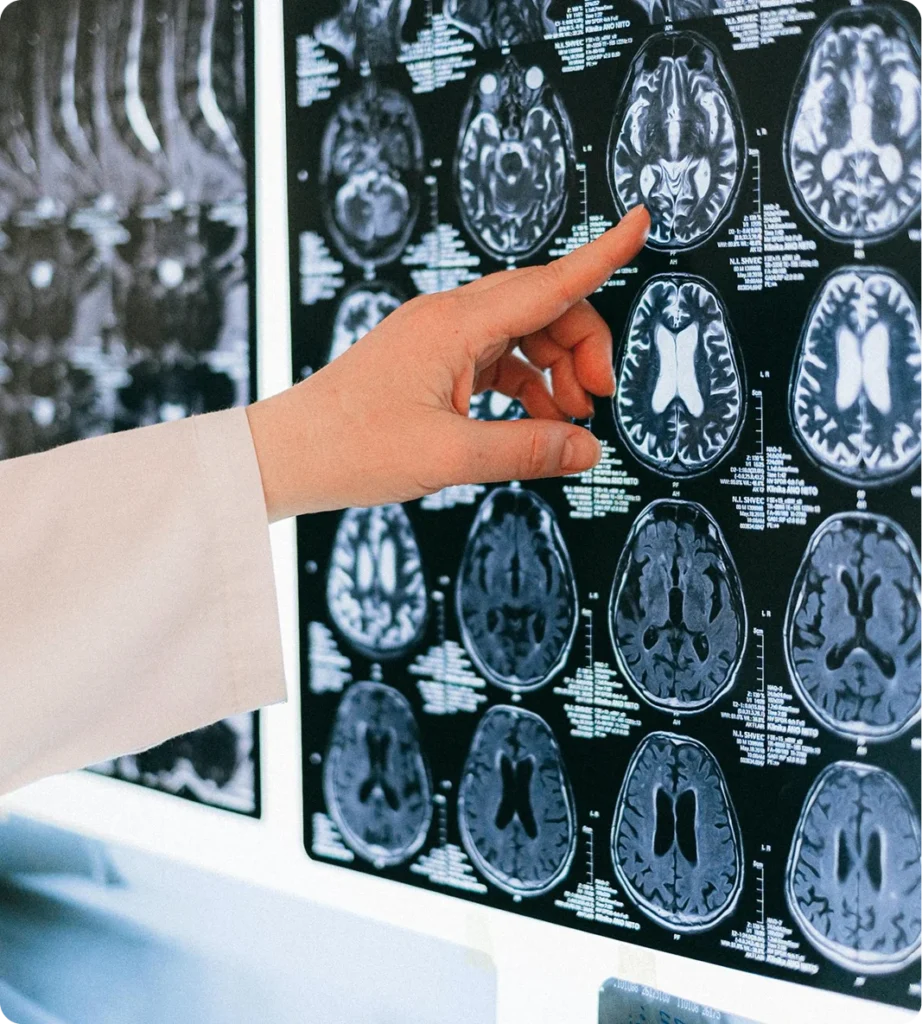Neurological Disorders Treatment in Delhi
Expert Care for Brain, Spine, and Nerve Conditions — Right Here in Delhi

What Are Neurological Disorders?
Neurological disorders are conditions that affect the brain, spinal cord, or nerves — the key components of your nervous system. These conditions can interfere with how you move, speak, think, or feel.
They are broadly classified based on which part of the nervous system they affect:
The Central Nervous System (CNS), which includes the brain and spinal cord
The Peripheral Nervous System (PNS), which connects the CNS to the rest of the body
Neurological disorders can affect both adults and children, and may be caused by infections, trauma, autoimmune conditions, genetics, or poor blood supply (as in stroke).
You may have heard of epilepsy, Parkinson’s disease, migraine, multiple sclerosis, or neuropathy — all of these are neurological disorders. Symptoms vary depending on the condition but may include seizures, numbness, memory loss, muscle weakness, or chronic pain.
We offer neurological disorders treatment in Delhi using a personalised, diagnosis-driven approach to help manage symptoms and improve quality of life.

Common Neurological Conditions We Treat
At our center for neurological disorders treatment in Delhi, we diagnose and manage a wide range of conditions that affect the brain, spine, and nerves.
Whether your symptoms are sudden or have developed gradually over time, our goal is to identify the root cause and provide long-term relief.
Here are some of the most common neurological conditions we treat:
Epilepsy & Seizure Disorders – Uncontrolled electrical activity in the brain leading to seizures
Stroke & Paralysis – Sudden disruption in blood flow to the brain, often causing weakness or speech difficulties
Migraine & Chronic Headaches – Debilitating head pain, sometimes with nausea, light sensitivity, or aura
Parkinson’s Disease – A progressive condition causing tremors, stiffness, and balance issues
Peripheral Neuropathy – Nerve damage that causes pain, tingling, or numbness, usually in the hands and feet
Multiple Sclerosis (MS) – An autoimmune disorder where the body attacks its own nerves
Myopathies & Muscle Weakness – Conditions that affect muscle strength and function
Brain Infections or Inflammation – Such as meningitis or encephalitis
If you or your loved one is experiencing symptoms that may point to a neurological issue, don’t wait. Our clinic offers expert neurological disorders treatments, tailored to your condition and stage of illness.
Signs You Should See a Neurologist
Sometimes, neurological symptoms can be subtle at first, but catching them early can make a big difference in diagnosis and treatment. If you’re noticing any of the following signs, it may be time to consult a specialist:
Frequent or severe headaches that don’t go away with usual treatment
Sudden weakness or numbness, especially on one side of the body
Dizziness, balance problems, or unexplained falls
Memory loss, confusion, or difficulty concentrating
Double vision, blurred sight, or slurred speech
Tingling or burning sensations in your hands or feet
Persistent fatigue or muscle weakness
Seizures or blackout spells
Speech difficulties or trouble understanding language
Mood changes or personality shifts without clear reason
If you’re experiencing any of these issues, we offer neurological disorders treatment in Delhi that combines expert clinical judgment, advanced diagnostics, and compassionate care.
How We Diagnose Neurological Disorders
Accurate diagnosis is the first step to effective treatment. We follow a systematic, patient-centred approach to identify the root cause of your symptoms.
Here’s what our diagnostic process typically includes:
Detailed Medical History
We begin by listening closely — understanding your symptoms, when they started, and how they’ve changed over time. Family history and lifestyle factors also play a role.
Neurological Examination
This includes checking your reflexes, muscle strength, coordination, balance, speech, vision, and mental function.
Advanced Imaging Tests
We may recommend:
- MRI or CT Scan – to detect structural issues in the brain or spine
- EEG (Electroencephalogram) – to study brain activity and detect seizures
- EMG & Nerve Conduction Studies – to assess muscle and nerve function
Blood Tests & Genetic Testing
These help rule out infections, autoimmune causes, or inherited disorders.
Cognitive & Behavioural Assessments
Used when memory loss, attention issues, or personality changes are involved.
With the right combination of clinical expertise and technology, we ensure a thorough evaluation, so that your neurological disorders treatment is guided by accurate, evidence-based insights.
Advanced Neurological Treatments Offered in Delhi
When it comes to treating neurological disorders, there is no one-size-fits-all solution. That’s why we focus on personalised, evidence-based care, tailored to your condition, symptoms, and goals.
We offer a wide range of treatment options designed to manage symptoms, slow progression, and improve quality of life:

Medication Management
We prescribe and monitor medications to control seizures, manage Parkinson’s symptoms, relieve nerve pain, reduce inflammation, or stabilise mood and cognition, depending on your condition.
Botox Injections
Used for treating chronic migraine, facial spasms, and spasticity in conditions like stroke or multiple sclerosis.

Rehabilitation & Physiotherapy
For patients with stroke, muscle weakness, or balance problems, we work with physiotherapists to help restore movement, strength, and coordination.
Lifestyle & Nutritional Guidance
We counsel patients on managing sleep, stress, diet, and physical activity, which are essential for neurological health.


Monitoring & Long-Term Support
Neurological conditions often require regular follow-up. We track your progress, adjust treatments, and stay ahead of complications.
Why Choose Us for Neurological Disorders Treatment in Delhi?
When it comes to something as delicate as the brain, spine, or nerves, experience, precision, and empathy matter. Here’s why patients across Delhi trust us for their neurological care:
Experienced Neurologist
Led by Dr. Shishir, a highly trained specialist with years of experience in diagnosing and managing complex neurological conditions, we bring both clinical expertise and a human touch to every case.
Comprehensive, Evidence-Based Care
From common headaches to rare neurological syndromes, we follow globally accepted protocols customized to your specific diagnosis and stage of illness.
Advanced Diagnostic Facilities
Our clinic is equipped with high-end imaging, neuro-electrophysiological testing, and cognitive assessment tools to ensure an accurate and timely diagnosis.
Collaborative & Compassionate Approach
We listen, explain, and involve you in your care plan, ensuring you’re never left confused or overwhelmed.
Centrally Located in Delhi
Easily accessible from all parts of the city, our clinic is a go-to destination for those seeking quality neurological disorders treatment in Delhi, without the long hospital queues or delays.
FAQs on Neurological Disorders Treatment in Delhi
Some neurological conditions, like certain types of infections or migraines, can be treated completely. Others, such as Parkinson’s or multiple sclerosis, may not have a cure but can be effectively managed with long-term care and lifestyle adjustments.
A neurologist diagnoses and treats neurological conditions using non-surgical methods (medications, therapies). A neurosurgeon performs surgeries for conditions that require physical intervention, such as brain tumours or spinal compression.
If you’re experiencing unexplained headaches, weakness, numbness, seizures, memory issues, or loss of balance, it’s a good idea to see a neurologist for a proper evaluation.
Most neurological tests like MRI, EEG, or nerve conduction studies are non-invasive and painless. Some may feel mildly uncomfortable but are generally well-tolerated.
It depends on the specific condition and how early it’s diagnosed. Some patients improve in a few weeks, while others may require ongoing treatment and follow-up care.
Not always. For some conditions, short-term treatment is enough. However, chronic or progressive conditions may require long-term medication and monitoring.
Absolutely. Managing sleep, reducing stress, eating a balanced diet, and staying active can significantly improve symptoms and slow disease progression in many neurological conditions.
